仁爱版英语七年级上册
2024年仁爱版英语教材七年级上册
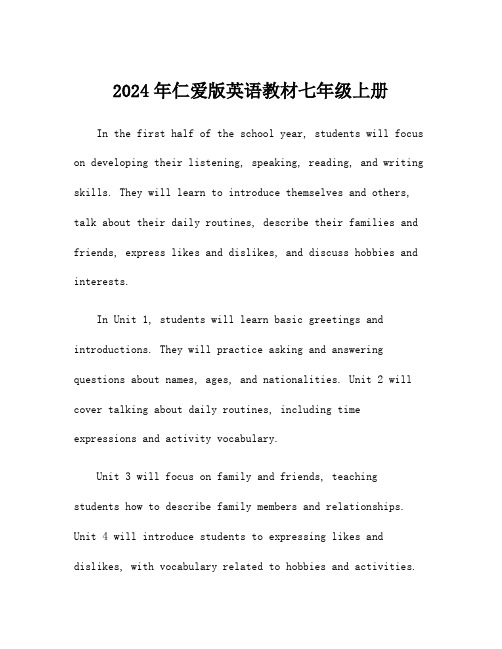
2024年仁爱版英语教材七年级上册In the first half of the school year, students will focus on developing their listening, speaking, reading, and writing skills. They will learn to introduce themselves and others, talk about their daily routines, describe their families and friends, express likes and dislikes, and discuss hobbies and interests.In Unit 1, students will learn basic greetings and introductions. They will practice asking and answering questions about names, ages, and nationalities. Unit 2 will cover talking about daily routines, including time expressions and activity vocabulary.Unit 3 will focus on family and friends, teaching students how to describe family members and relationships. Unit 4 will introduce students to expressing likes and dislikes, with vocabulary related to hobbies and activities.In the second half of the year, students will continue to build on these foundational skills while also learning about different cultures and traditions. They will study topics such as food and eating habits, school life, and holidays and celebrations.Overall, the seventh-grade English curriculum will provide a strong foundation for students to communicate effectively in both spoken and written English, while also fostering an appreciation for diverse cultures and perspectives.。
仁爱版七年级上册英语全册知识点总结

考点一 thank的用法 【课文原句】 Thank you. 谢谢你。(七上P1) thank常用在日常交际中,表示对对方的感激之情。其常用 句型为thank sb. for (doing) sth.“因(做)某事而感谢某人”, 相当于“thanks for (doing) sth.”。
单项选择 4.(2019·预测)—Hello, this is Tina speaking. Is that Sam? —Sorry, he isn't here at this moment. _A__? A.Can I take a message B.What are you saying to Tina C.May I speak to Sam D.What's that speaking
【拓展】
词汇 helpful helpless
含义
用法
有帮助的;有用的
be helpful to...“对……有用 ”
feel helpless“感到无能为力 无助的;无法抑制的
”
用适当的介词填空 13.Bill has made great progress _w__it_h_ the help of his teacher.
单项选择
7.(2018·安徽中考)—Will you go to the picnic this Saturday?
—I'd like to, _A__ I'll have to help look after my baby sister.
A.but
B.or
C.and
D.so
8.(2018·湖北襄阳中考)—Be quick, _C__ we'll fail to catch
仁爱英语七年级上册知识点归纳完整版
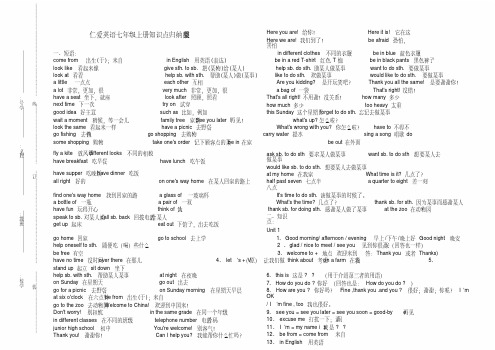
仁爱英语七年级上册知识点归纳完整版Here you are! 给你!Here it is! 它在这Here we are! 我们到了!be afraid 恐怕,害怕一、短语:in different clothes 不同的衣服be in blue 蓝色衣服come from 出生(于);来自in English 用英语(表达) be in a red T-shirt 红色 T 恤be in black pants 黑色裤子look like 看起来像give sth. to sb. 把(某物)给(某人) help sb. do sth.助某人做某事want to do sth. 要做某事look at 看着help sb. with sth. 帮助(某人)做(某事) like to do sth. 欢做某事would like to do sth. 要做某事a little 一点点each other 互相Are you kidding? 是开玩笑吧?Thank you all the same! 是要谢谢你!a lot 非常,更加,很very much 非常,更加,很 a bag of一袋That's right!没错!:号学线have a seat坐下,就座look after 照顾,照看next time 下一次try on 试穿good idea 好主意such as 比如,例如That's all right!不用谢!没关系!how many多少how much多少too heavy太重this Sunday这个星期日forget to do sth.忘记去做某事wait a moment 稍候,等一会儿family tree 家谱S ee you later再!见!what's up?怎么啦?look the same 看起来一样have a picnic 去野餐What's wrong with you?你怎么啦?have to不得不go fishing 去钓鱼go shopping 去购物carry water提水sing a song唱歌 do some shopping购物take one's order记下顾客点的菜be in 在家be out在外面:名姓fly a kite 放风筝different looks 不同的相貌have breakfast吃早餐have lunch 吃午饭ask sb. to do sth要. 求某人做某事want sb. to do sth想.要某人去做某事would like sb. to do sth.想要某人去做某事订have supper吃晚饭have dinner 吃饭all right 好的on one's way home 在某人回家的路上at my home在我家What time is it?几点了?half past seven七点半 a quarter to eight差一刻八点find one's way home 找到回家的路 a glass of 一玻璃杯It's time to do sth.该做某事的时候了。
仁爱英语七年级上单词表(含音标)最新修改完善版
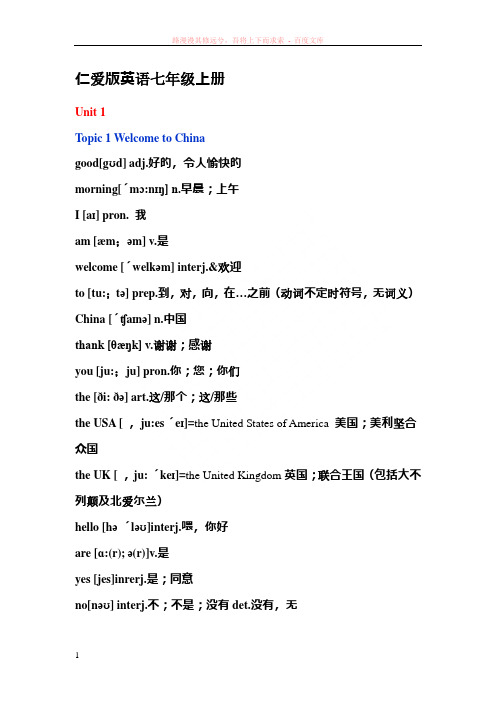
仁爱版英语七年级上册Unit 1Topic 1 Welcome to Chinagood[gʊd] adj.好的,令人愉快的morning[´mɔ:nɪŋ] n.早晨;上午I [aɪ] pron. 我am [æm;əm] v.是welcome [´welkəm] interj.&欢迎to [tu:;tə] prep.到,对,向,在…之前(动词不定时符号,无词义)China [´ʧaɪnə] n.中国thank [θæŋk] v.谢谢;感谢you [ju:;ju] pron.你;您;你们the [ði: ðə] art.这/那个;这/那些the USA [ ,ju:es ´eɪ]=the United States of America美国;美利坚合众国the UK [ ,ju:´keɪ]=the United Kingdom英国;联合王国(包括大不列颠及北爱尔兰)hello [hə´ləʊ]interj.喂,你好are [ɑ:(r);ə(r)]v.是yes [jes]inrerj.是;同意no[nəʊ] interj.不;不是;没有det.没有,无not[na:t] [nɒt] adv.不;没有oh [əʊ] interj.哦;啊nice[naɪs]adj.令人愉快的,友好的meet [mi:t]v.结识;遇见too [tu:]adv.也;太;很hi [haɪ] interj. 喂thanks [θæŋks] interj.&n. 感谢,谢谢Mr.=Mister [´mɪstə ]n.先生see [si:] v.遇见;看到;明白mom [ma:m] [mɒm] (mum[mʌm]) n.妈妈this [ðɪs]pron. &det. 这;这个is [ɪs]v.是my [maɪ] det.我的teacher [´ti:ʧə(r)] n.老师,教师how[haʊ] adv.怎样;多少;多么do[du:;du] v.aux.构成否定句,疑问句的助动词,无词义dad [dæd] n.爸爸Miss [mɪs] n.女士,小姐Ms. [mɪz;məz] n.女士afternoon[,æftə´nu:n] [,ɑ:ftə nu:n] n.下午goodbye [,gʊd´baɪ] interj. 再见bye [baɪ] interj. 再见fine[faɪn] adj.健康的;晴朗的and [ænd;ənd] conj.和OK [əʊ´keɪ] adj. (口语)安然无恙interj. 好,行here [hɪə] adv. 在这里Topic 2 Where are you from?excuse [ɪk´skju:z] v.原谅me [mi:;mi] pron.我what [wa:t] [wɒt] prin.什么your [jɔ:(r)] det.你的;你们的name [neɪm] n.名字;名称please [pli:z] interj. 请where [weə] adv.在/到哪里from [fra:m] [frɒm] prep.来自;从Canada [´kænədə] n.加拿大America [ə´merɪkə] n.美国Japan [ʤə´pæn] n.日本England [´ɪŋglənd] n.英国they [ðeɪ] pron. 他/她/它们who [hu:] pron. 谁Cuba [ kju:bə] n.古巴he [hi:;hi] pron.他she [ʃi:;ʃi] pron. 她look [lʊk] v.看;看起来telephone [´telɪfəʊn] n.电话number [´nʌmbə(r)] n.(NO.)号码;数字;数量it [ɪt] pron.它very [´veri] adv.非常much [mʌʧ] adv.非常,很;det. 多少,许多,大量very much 非常,很that [ðæt] pron.&det. 那,那个zero [´zɪrəʊ] [´zɪərəʊ] num.零one [wʌn] num.一pron. 一(个,只…)two [tu:] num.二three [θri:] num.三four [fɔ(r)] num.四five [faɪv] num.五six [sɪks] num.六seven [´sevən] num.七eight [eɪt] num.八nine [naɪn] num.九ten [ten] num.十her [hɜ(r);hə(r)] det.她的pron. 她family [´fæməli] n.家庭;家族Topic 3 How old are you?twelve [twelv] num.十二year [jɪə(r)] n.年old [əʊld]adj.---岁的;老的,旧的class[klæs] [klɑ:s] n.班级,课in [ɪn] prep.在---里;用;以;穿着,戴着adv.在家;在里面grade [greɪd] n.年级eleven [ɪ´levən] n.十一thirteen [,θɜ:(r)´ti:n] num.十三fourteen [,fɔ(r):´ti:n] num.十四fifteen [,fɪf´ti:n] num.十五sixteen [,sɪks´ti:n] num.十六seventeen [,sevn´ti:n] num.十七eighteen [,eɪ´ti:n] num.十八nineteen [,naɪn´ti:n] num.十九twenty [´twenti] num.二十English [´ɪŋglɪʃ] n.英语adj.英国的;英语的;英国人的an [æn;ən]art.一(个,件……)eraser [ɪ´reɪzər] n.橡皮,黑板擦map [mæp] n.地图pen [pen] n.钢笔pencil [´pensl] n.铅笔desk [desk] n.书桌an [ən] art.一(个,件…)spell [spel] v.拼写a [ə] art.一(个,件…)a [ə;ei]art.一(个,件……)can [kən;kæn] modal v.能,会apple [´æpl] n.苹果toy [tɔɪ] n.玩具wow [waʊ] interj.呀,哇try [traɪ] v.试;试图,努力again [ə´gen] [ə´geɪn]adv.再一次those [ðəʊz] pron. & det.那些book [bʊk] n.书;本子v.预约,预订these [ði:z] pron. & det.这些let [let] v.让help [help] v.& n.帮助ruler [´ru:lə(r) ] n.尺子car [kɑ:(r)] n.小汽车,轿车egg [eg] n.蛋orange [´a:rɪnʤ] [´ɒrɪnʤ]n.柑橘;橘黄色adv.橘黄色的bus [bʌs] n.公共汽车box [ba:ks] [bɒks] n.箱,盒now [naʊ] adv.现在school [sku:l] n.学校Beijing International [,ɪntə(r)´næʃənəl]School 北京国际学校his [hɪs] pron. & det.他的same [seɪm] adj.相同的pron. (和…)同样的事物but [bʌt;bət] conj.但是,可是friend [frend] n.朋友junior [´ʤu:nɪə(r)] adj.初级的high [haɪ] adj.高的adv.在高处,向高处junior high school 初中Review of Unit 1girl [gɜ:(r)l] n.女孩we [wi:;wi] pron.我们student [´stu::dənt] [´stju:dənt] n.学生speak [spi:k] v.讲,说;谈话Unit 2Topic 1 I have a small nose.guess [ges] v.猜have [hæv;həv] v.有;吃;喝small [smɔ:l] adj.小的nose [nəʊz] n.鼻子has [hæs]v.有(have的第三人称单数形式)big [bɪg] adj.大的eye [aɪ] n.眼睛know [nəʊ] v.知道;认识right [raɪt] adj.正确的;右边的n.右边ear [ɪə] n.耳朵hair [heə(r)] n.头发head [hed] n.头face [feɪs] n.脸neck[nek] n.脖子mouth [maʊθ] (pl. mouths[mauðz]) n.嘴round [raʊnd] adj.圆形long [lɔ:ŋ] adj.长的wide [waɪd] adj.宽的favorite [´feɪvərɪt] (favourite BrE) adj. 最喜爱的n.特别喜欢的人/物actor [´æktə(r)] n.演员Chinese [,ʧaɪ´ni:z] n.中国人;汉语adj. 中国的;中国人的;汉语的does [dʌz]v.(do的第三人称单数)arm[ɑ:m] n. 胳膊hand [hænd] n.手leg[leg] n.腿foot[fut](pl. feet[fi:t])n.脚;英尺short [ʃɔ:(r)t]adj.短的;矮的boy [bɔɪ]n.男孩come[kʌm] v.来,来到come from 出生于;来自sister [´sɪstə(r)] adj.姐,妹different [´dɪfrənt] adj.不同的knife[naɪf](pl. knives[naɪvz])n小刀Topic 2 What does she look like?black [blæk]adj.黑色的n.黑色blond[bla:nd] [blɒnd]adj.金黄色的blue [blu:] adj.蓝色的n.蓝色color[´kʌlə(r)] (color BrE) n.颜色v.给…着色,涂色pink [pɪŋk] n.粉红色adj.粉红色的red [red]n.红色adj.红色的purple[´pɜ(r):pl] n.紫adj.紫色的brown [braʊn]n.棕色adj.棕色的gray[greɪ](grey BrE)n.灰色adj.灰色的yellow[´jeləʊ] n.黄色adj.黄色的green [gri:n]n.绿色adj.绿色的white[waɪt] n.白色adj.白色的give [gɪv] v.给letter[´letə] n.信:字母sorry [´sa:ri] [´sɔri] interj.对不起,抱歉adj.难过的like [laɪk] perp.像;像…一样v.喜欢;喜爱tall [tɔ:l] adj.高的will [wɪl] v.会;将for[fɔ:(r);fə(r)]prep.(表示对象,用途等)给;因为…;对于…young [jʌŋ]adj.年轻的man [mæn] (pl. men)n.男人woman[´wʊmən](pl.women [´wɪmɪn])n.成年女子,妇女snowman[´snəʊmæn] (pl. snowmen[ snəʊmen])n.雪人want[wa:nt] [wɒnt] v. 想要;需要buy [baɪ]v.买T-shirt [´ti:ʃɜ(r)t]n.T恤衫cap[kæp] n.便帽pair [peə(r)] n.一对;一双of[ɔv; əv]prep.表示,数量,其中)的shoe [ʃu:] n.鞋coat [kəʊt]n. 外套;大衣dress [dres] n.连衣裙pants[pænts] (trousers[´traʊzə(r)z] BrE)n.(pl.)裤子skirt [skə:(r)t] n.(女式)短裙glove [glʌv]n.(分手指的)手套at [æt;ət] prep.向;在(几点钟);在(某处)look at 看着photo [´fəʊtəʊ]n.照片strong[strɔ:ŋ] [strɒŋ] adj.强壮的happy [´hæpi] adj.幸福的,快乐的;高兴地next [nekst]adj.下一个的adv.随后next to 在…近旁,紧邻shirt[ʃɜ:t] n.(尤指男式)衬衫cool [ku:l] adj.酷;凉爽的other [´ʌðə(r)] pron. &adj.另外,其他Topic 3 Whose cap is it?mine [maɪn] pron.我的whose [hu:s] det. &.pron.谁的then [ðen] adv.那么;那时;然后yours [jɔ:(r)z] pron.你的;你们的hers[hɜ:(r)z] pron.她的ours [a: (r)z] [´aʊə(r)z]pron.我们的theirs [ðeəz] pron.他/她/它们的bike[baɪk] n.自行车cat [kæt] n.猫our [a: (r); ´aʊə (r)] det.我们的banana[bə´nænə] [bə´nɑ:nə] n.香蕉their [ðeə]det.他/她/它们的jacket [´ʤækɪt] n.夹克衫;短上衣think [θɪŋk] v.想,认为;思考schoolbag [´sku:lbæg] n.书包baby [´beɪbi] n.动物幼崽;婴儿new [nu:] [nju:] adj.新的classmate[´klæsmeɪt] [´klɑ:smeɪt]n.同班同学clothes [kləʊðz; kləʊz] n.(pl.)衣服us [ʌs; əs] pron.我们find[faɪnd] v.找到him [hɪm] pron.他police[ pə´li:s] n.警察Unit 3Topic1 Does he speak English?could [kʊd; kəd] modal v.可以;(can 的过去式)能tell [tel] v.告诉sure [ʃuə(r)] adv.(表示同意)当然adj.确信的,肯定的pen pal[´pen pæl] =penfriend [´penfrend]n.笔友some [sʌm;səm] det.&pron.一些with[wɪð]prep.具有;和;用problem[ ´pra:bləm] [ ´prɒbləm] n.问题well [wel] adv.很好地;充分地interj.好吧,那么;adj.健康的;良好的often [´ɔ:f(tə)n] [´ɒf(tə)n] adv.经常lot [la:t] [lɒt] pron.许多a lot 许多about [ə´baʊt]prep.关于adv. 大约live[lɪv] v.居住;生活say [seɪ] v.说,讲visit [´vɪzɪt] v.&n.参观;拜访many [´meni] det.许多的pron.许多(人或物)little [´lɪtl] adv.一点儿,稍许adj.小的a little 一点儿so [səʊ] conj.因此,所以adv.如此,这么them [ðem; ðəm] pron.他/她/它们each [i:ʧ] pron.各个,每个each other 互相,全部all[ɔ:l] pron.所有,全部not…at all 一点儿也不,根本不read [ri:d] v.读;朗读a lot of 许多people [´pi:pl] n.人;人们every [´evri] det.每一个,每个day[deɪ]n. 一天,一日;白天Topic 2 What does your mother do?home[həʊm] adv.到家;在家n.家kid [kɪd] n.小孩adv.开玩笑glad [glæd] adj.高兴地,愉快的mother [´mʌðə]n. 母亲father[´fɑ:ðə] n.父亲doctor[´da:ktə(r)] [´dɒktə(r)]n.医生parent [´perənt] [´pærənt] n.父(母)亲office [´ɔ:fɪs] [´ɒfɪs] n.办公室worker [´wɜ(r):kə(r)] n.工人driver [´draɪvə(r)] n.司机farmer[´fɑ:mə] n.农民cook[kʊk] n.厨师v.烹饪,烹调nurse[nɜ:(r)s] n. 护士show [ʃəʊ] v.给…看,出示;表明n.演出;展示;展览work[wɜ:(r)k] v.工作;运转n.工作,劳动hospital [´ha:spɪtl] [´hɒspɪtl] n.医院restaurant [´restəra:nt] [´restərɒnt]n.餐馆on [a:n] [ɒn] perp.在…上;关于farm[fɑ:(r)m] n. 农场teach [ti:ʧ] v.教act[ækt] v. 扮演,表演drive [draɪv] v.驾驶,开车aunt [ænt][ɑ:nt] n.婶母,伯母,姨母,舅母,姑母uncle [´ʌŋkl] n.叔,伯,舅,叔父,姑父,姨父brother [´brʌðə(r)] n.兄,弟sofa [´səʊfə] n.沙发grandparent [´grænperənt] [´grænpεərənt] n.祖父(母),外祖父(母)cousin[´kʌzn] n. 堂(表)姐妹;堂(表)兄弟daughter [´dɔ:tə(r)] n.女儿tree[tri:] n.树family tree 家谱son[sʌn] n.儿子cute[kju:t] adj.可爱的;机灵的play [pleɪ]v.玩耍;演奏n.戏剧its [ɪts] det.它的;他的;她的love [lʌv] v. & n.爱;喜爱Topic3 What would you like to drink?yourself[jɔ(r)´self] (pl. yourselves[jɔ:(r)selvz])pron.你自己would[wʊd] modal v.打算,想要;(will的过去式)将会fish[fɪʃ] n.鱼 v. 钓鱼chicken[´ʧɪkɪn] n.鸡肉;鸡rice [raɪs]n.大米;稻米drink [drɪŋk] v.喝n.饮料juice[ʤu:s] n.果汁milk [mɪlk]n.牛奶idea[aɪ´dɪ:ə] [aɪ´dɪə] n.主意water[´wa:tə(r)] [´wɔ:tə(r)] n.水vegetable [´veʤtəbl] n.蔬菜bread [bred] n.面包hamburger [´hæmbɜ:(r)gə(r)] n.汉堡包usually[ ˊ ju:ʒʊəli; ˊ ju:ʒəli ] adv.通常地breakfast [ ˊbrekfəst]n.早餐lunch[lʌnʧ] n.午餐dinner [´dɪnə]n.晚餐food[fu: d] n.食物may [meɪ]v.可以;可能take [teɪk] v.拿;乘坐;花费;服用;携带order [´ɔ: (r)də(r)] n.命令;顺序v. 命令;点菜;组织sir[sɜ:(r);sə(r)] n.先生something[´sʌmθɪŋ]pron.某物/事glass [glæs] [glɑ: s] n.(玻璃)杯mm [m] interj.嗯eat [i:t] v.吃out [aʊt] adv.在(到)外面why [waɪ] adv. 为什么dear [dɪə(r)] adj.亲爱的;昂贵的kind [kaɪnd] adj.友好的n.种;类be [bi:;bi] v.在;是Review of Unit 3there[ðeə(r)] adv.在哪里go [gəʊ] v.走,去get[get] v.得到;到达zoo[zu:] n.动物园Sunday [´sʌndeɪ;´sʌndɪ] n.星期日need [ni: d] v.& modal v.需要dog [dɔ:g] [dɒg] n.狗look forward[´fɔ:(r)wə(r)d] to 盼望Unit 4Topic 1 What can I do for you? shop [ʃa:p] [ʃɒp] n.商店v. 购物madam [´mædəm] n.夫人;女士try[traɪ] on 试穿seventy [´sevənti] num.七十thirty [´θɜ:ti] num.三十forty [´fɔ:ti] num.四十fifty [´fɪfti] num.五十sixty [´sɪksti] num.六十eighty[´eɪti] num.八十ninety [´naɪnti] num.九十hundred [ ´hʌndrəd] num.百just [ʤʌst] adv.仅仅;只是think of 认为;想起think about 考虑anything [ ´eniθɪŋ] pron.任何东西(事物)mean [mi:n] v.意思是kilo[´kɪləʊ] =kilogram[´kɪləʊgræm] n.千克bag[bæg] n.袋子loaf[ləʊf] n.一条(面包)bar[bɑ:]n.(长方形)条,块;酒吧bottle [´ba:tl] [´bɒtl]n.一瓶(的量);瓶子tin [tɪn] n.听,罐save [seɪv]v. 节省;攒钱;挽救chocolate [´ʧa:kəlɪt] [´ʧɒkəlɪt] n. 巧克力Coke [kəʊk]n.可乐do some shopping购物any[´eni] det.任何的;任一的pron.任一,任何,一些heavy [ ´hevi] adj.重的er [ə] interj.哦,嗯Topic 2 Would you like to cook with us?free [fri:] adj.空闲的;免费的up[ʌp] adv. (尤指异常或不愉快的事)发生;向上West Hill 西山picnic [´pɪknɪk] n.野餐call[kɔ:l]v.(给…打电话);称呼when [wen] adv.什么时候,何时conj.当…的时候tomorrow[tə´ma:rəʊ] [tə´mɒrəʊ]adv.明天sing[sɪŋ]v.唱歌song [sɔ:ŋ] [sɒŋ] n.歌曲,歌have to 不得不fly [flaɪ] v.放(风筝、飞机模型等);飞行kite[kaɪt] n.风筝time[taɪm] n.时间;次,回bow-wow[bəʊ-waʊ]n.狗汪汪叫声ask [æsk] [ɑ:sk] v.请求;邀请;询问back[bæk]adv.回到(原处);往后n.背部,后部evening[´i:vnɪŋ ] n.晚上;傍晚way [weɪ] n.路,道路;方式hhomework [ ´həʊmwɜ:k] n.家庭作业do one’s home work 做家庭作业Topic 3 What time is it now?panda [´pændə] n.熊猫monkey [´mʌŋki] n.猴子lion[´laɪən] n.狮子tiger [´taɪgə] n.老虎elephant [´elɪfənt] n.象o’clock[ə´kla:k] [ə´klɒk] adv.……点钟past [pæst] [pɑ:st] prep. 在…之后;超过;经过 n.过去,往事quarter[´kwɔ:(r)tə(r)]n.一刻钟;四分之一half [hæf] [hɑ:f] n.半,一半a.m. [ ´eɪæm] 上午,午前clever[´klevə(r)]adj.聪明的聪颖的animal [´ænɪməl] n.动物hour [´aʊə(r)] n.小时later[´leɪtə(r)] adv.以后;后来today [tə´deɪ] adv. 在今天;当今n. 今天,当今get up 起床,起来meat[mi:t]n.肉类;(某种)食用肉rabbit[´ræbɪt] n.兔Review of 3-4p.m. [´pi:æm]下午,午后if[ɪf] conj.如果,是否email [´i:meɪl] n.电子邮件v. 用电邮发送路漫漫其修远兮,吾将上下而求索- 百度文库21。
仁爱英语七年级(上册)单词表
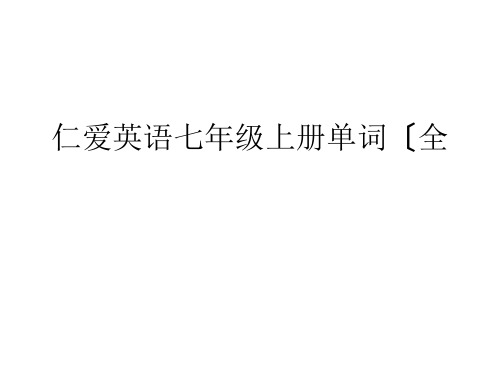
Topic 2 What does she look like?
• black [blæk]adj.黑色的n.黑色 • blond [blɒnd]adj.金黄色的 • blue [blu:] adj.蓝色的 n.蓝色 • color[ ḱ ʌlə] <color BrE> n.颜色 v.给…着色,涂
女子,妇女
• want[wɒnt] v. 想要;需要 • buy [baɪ]v.买 • T-shirt [ t́ i:ʃɜ:t]n.T恤衫 • cap[kæp] n.便帽 • pair [peə] n.一对;一双 • of[ɒf]prep.表示,数量,其中的 • shoe [ʃu:] n.鞋 • coat [kəʊt]n. 外套;大衣 • dress [dres] n.连衣裙
• ear [ɪə] n.耳朵 • hair [heə] n.头发 • head [hed] n.头 • face [feɪs] n.脸 • neck[nek] n.脖子 • mouth [maʊθ] <pl. mouths[mauðz]> n.嘴 • round [raʊnd] adj.圆形
• long [lɔ:ŋ] adj.长的 • wide [waɪd] adj.宽的 • favorite [ ́feɪvərɪt] <favourite BrE> • adj. 最喜爱的 n.特别喜欢的人/物 • actor [ ́æktə] n.演员 • Chinese [,ʧaɪ ń i:z] n.中国人;汉语 • adj. 中国的;中国人的;汉语的 • does [dʌz]v.<do的第三人称单数>
• to [tu:] prep.到,对,向,在…之前
• China [ ʧ́ aɪnə] n.中国
仁爱英语七年级上册知识点归纳完整版
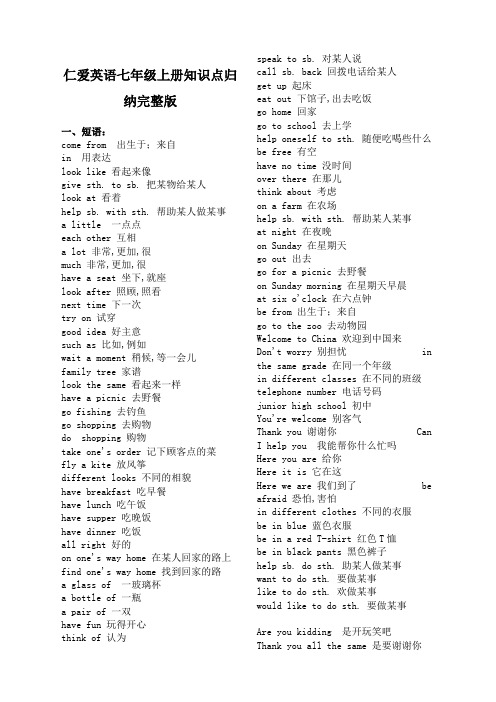
仁爱英语七年级上册知识点归纳完整版一、短语:come from 出生于;来自in 用表达look like 看起来像give sth. to sb. 把某物给某人look at 看着help sb. with sth. 帮助某人做某事a little 一点点each other 互相a lot 非常,更加,很much 非常,更加,很have a seat 坐下,就座look after 照顾,照看next time 下一次try on 试穿good idea 好主意such as 比如,例如wait a moment 稍候,等一会儿family tree 家谱look the same 看起来一样have a picnic 去野餐go fishing 去钓鱼go shopping 去购物do shopping 购物take one's order 记下顾客点的菜fly a kite 放风筝different looks 不同的相貌have breakfast 吃早餐have lunch 吃午饭have supper 吃晚饭have dinner 吃饭all right 好的on one's way home 在某人回家的路上find one's way home 找到回家的路a glass of 一玻璃杯a bottle of 一瓶a pair of 一双have fun 玩得开心think of 认为speak to sb. 对某人说call sb. back 回拨电话给某人get up 起床eat out 下馆子,出去吃饭go home 回家go to school 去上学help oneself to sth. 随便吃喝些什么be free 有空have no time 没时间over there 在那儿think about 考虑on a farm 在农场help sb. with sth. 帮助某人某事at night 在夜晚on Sunday 在星期天go out 出去go for a picnic 去野餐on Sunday morning 在星期天早晨at six o'clock 在六点钟be from 出生于;来自go to the zoo 去动物园Welcome to China 欢迎到中国来Don't worry 别担忧 in the same grade 在同一个年级in different classes 在不同的班级telephone number 电话号码junior high school 初中You're welcome 别客气Thank you 谢谢你 Can I help you 我能帮你什么忙吗Here you are 给你Here it is 它在这Here we are 我们到了 be afraid 恐怕,害怕in different clothes 不同的衣服be in blue 蓝色衣服be in a red T-shirt 红色T恤be in black pants 黑色裤子help sb. do sth. 助某人做某事want to do sth. 要做某事like to do sth. 欢做某事would like to do sth. 要做某事Are you kidding 是开玩笑吧Thank you all the same 是要谢谢你a bag of一袋That's right没错That's all right不用谢没关系 how many多少how much多少 too heavy太重this Sunday这个星期日forget to do sth.忘记去做某事See you later再见 's up怎么啦's wrong with you你怎么啦 have to 不得不carry water提水sing a song唱歌be in在家be out在外面ask sb. to do sth.要求某人做某事want sb. to do sth.想要某人去做某事would like sb. to do sth.想要某人去做某事at my home在我家What time is it几点了half past seven七点半a quarter to eight差一刻八点It's time to do sth.该做某事的时候了; What's the time几点了thank sb. for sth.因为某事而感谢某人thank sb. for doing sth.感谢某人做了某事 at the zoo在动物园二、知识点:Unit 11、Good morning/ afternoon / evening 早上/下午/晚上好 Good night 晚安2 、glad / nice to meet / see you 见到你很高兴回答也一样3、welcome to + 地点欢迎来到答:Thank you 或者 Thanks4、let’s + V原让我们做5、 stand up 起立 sit down 坐下6、this is 这是…… 用于介绍第三者的用语7、How do you do 你好回答也是:How do you do 8、 How are you 你好吗 Fine ,thank you .and you 很好;谢谢;你呢I’m OK / I’m fine , too . 我也很好;9、 see you = see you later = see you soon = good-bye 再见10、 excuse me 打扰一下;请问11、I’m = my name is 我是……12、 be from = come from 来自13、 in English 用英语14、 Can you spell it Yes / No 你能拼写它吗能/不能15、That’s OK / That’s all right / You’re welcome / Not at all 不用谢16、…… years old ……岁17、 telephone number 电话号码number 号码 ID number 身份证18、 the same 相同的反义词是different 不同的例: We are in the same grade, but we are in different classes. 句型:19、What is your name 你的名字是什么20、Where +be + 主语 + from 某人来自于哪里回答:主语+be+地点例: Where are you fromI am from quanzhou.21、How old + be + 主语某人几岁回答:主语 + be + 数字例:How old are you I’m forteen.22、What is your telephone number 你的电话号码是多少回答:My telephone number is或者It’s 注意:读出号码的时候要逐个读出;23、What class / grade +be + 主语 + in 某人在哪一个班级/年级例:what class are you in I am in Class Five. 注意:Class 和 Five 需要大写what grade are you in I am in Grade Seven. 注意: Glass 和 Seven 需要大写 24、What’s this/ that in English 这是什么回答:It’s a/an + 单数名词. 这是…… What’ re these/ those in English 这些是什么回答:They’re + 复数名词这些是……25、How do you spell it 你怎么拼写它 E-R-A-S-E-R, eraser. 注意拼读方法Unit 2 1、 sb + has/ have an /a + adj + 五官 === sb’s 五官 is / are + adj 描述长相例:Lily has a small nose. = Lily’s nose is small. 2、 I know = I see 我明白了 3、That’s right 那是对的 4、look the same look like 看起来相像look different 看起来不同例: Jim and Lilei look the same.== Jim looks like Lilei. . 5、 look at + n 看某物 look for +n 寻找某人/某物 look after +n 照顾某人 6、 both 两者都…… all 三者或者三者以上都Both 和all 位于 be 动词或情态动词后,位于行为动词前;例: We are both students. We both have black eyes. We can both speak English. 注意: 7、 give sth to sb = give sb sth 把某物给某人;注意:如果 sth 是 it 或 them,只能用前者注意 ,只能用前者8、 have different looks == look different 有着不同的长相看起来不相像have the same look. ==look the same 有着相同的长相看起来很相像 9、over there 在那边 come in 请进 go out 出去 10、 in + 颜色或 in a/an/the +颜色 + 衣服表示穿着……颜色的衣服常常接在名词的后面,表示穿颜色衣服的…… 如 the girl in red is my sister.11、 too + adj 太……12、 pants 和shoes 做主语,谓语动词用复数;但 a pair of pants/ shoes 作主语时,谓语动词用单数形式例: His shoes are black. A pair of shoes is under the bed. 13、 in the morning/ afternoom/ evening 在早上/下午/晚上 at night 在晚上 14、 go shopping = go to the shop 去购物类似的有 go swimming go fishing go skating 等等帮助某人做某事注意:sb 用代词时必须用宾格 15、 help sb. to do sth == help sb with sth 16、 high school 中学 17、 play +球类 play the 乐器 18、 think of 认为,想 think about 考虑 I think + 从句我认为……例: I think he you are right.否定式常否定主句,但翻译时要否定后面的从句例:I don’t think he can come. 我认为他不会来了.不能说:我不认为他会来19、What do/does + 主语 + look like 询问人的长相例: What does your English teacher look like 20、What’s and ……加……是什么回答:It’s例:What’s red and yellow It’s orange. What’s two and five It’s seven. 21、Whose + 东西 + is this/ that Whose + 东西 +are these/ those 这/这些是谁的……例:Whose coat is this It is mine. Whose shoes are these They are hers.22、Who is the letter from 这封信来自于谁It’s f rom Lily. 它来自于莉莉;23、What color be + 东西回答:It’s +颜色或者They’er + 颜色例:What color is your dress It’s black.Unit 31、Could you please…… 后接动词原形你愿意做某事吗我能做某事吗 MayI …… 后接动词原形2、 the English corner 英语角3、 live in + 地点住在某地 live with + 人和某人住在一起4、 What does he say in the letter 他在信里说了些什么 What does he say on the phone 在电话里说了些什么5、 a lot = very much 放在句末,修饰动词,非常……not at all 一点也不……例: I like the boy a lot/ very much.I don’t like the boy at all.. 6、 each other 相互,彼此例: S tudents often talk to each other in class. 7、 do sth with sb 和某人一起做某事 8、 No problem 没问题9、 speak + 语言说某种语言 speak English speak Chinese 10、 the Great Wall 长城 11、 come/go to + 地点去某地但 home 、 here 、 there 这些是副词,前面不能加 to例:go home / come here / go there go to do sth 去做某事例: They go to play basketball. 12、 like doing sth 喜欢做某事 like to do sth 想要做某事 13、It’s + adj +to sb 对某人来说是……的 14、 help sb with sth =help sb to do sth 帮助某人某事 15、 be at home = be in 在家 go home 回家 get home 到家in one’s home 在某人的家里 16、 have a seat / take a seat / sit down 请坐下 17、office worker 办公室职员 cook 厨师cooker 炊具 18、 on a farm 在农场上on the sofa 在沙发上 19、 a photo of one’s family 某人的全家照 Family Tree 家谱首字母都大写 20、 in a hospital 在医院纯属地点概念 in hospital 因病住院例:He is ill in hospital. 他生病住院 He is in a hospital.他在医院里不一定是因为生病来到医院 21、 look after sb = take care of sb 照顾某人22、 teach sb sth = teach sth to sb 教某人某东西 teach sb to do sth 教某人做某事23、help oneself to sth. 请随便吃…… help yourself/ yourselves to fish24、I’d like sth = I would like sth. 我想要……25、 Would like to do sth = want to do sth 想要做某事26、 Would you like something to eat drink 你想要一些吃喝的东西吗 to eat 或 to drink 修饰 something,作为后置定语; 27、 Here you are . 给你 Here we are. 我们到了28、What about …… == Howabout …… ……怎么样后接代词或名词,还可以接动名词即What about doing sth29、 all right 好的30、a cup of tea 一杯茶 two cups of tea 两杯茶31、 milk for me 我要牛奶32、Why not ……后接动词原形 = Why don’t you …… 后接动词原形为什么不做某事呢回答:Good idea 好主意;33、 May I take your order 可以点菜了吗34、 wait a moment = just a moment 等一下,请稍侯 wait for sb 等待某人35、 Can I help you = May I help you = What can I do for you 需点什么帮忙吗36、 eat out 出去吃饭37、 let sb do sth 让某人做某事38、 have dinner/ breakfast/lunch/supper 吃正/早/午/晚餐39、 a kind of 一种…… all kinds of 各种各样的……40、be friendly/kind to sb 对某人友好41、 such as 例如例:I like fruits, such as oranges,bananas and apples42、 be glad to do sth例: I am glad to meet you, I am glad to be here.. 句型:43、What do/does + 主语+ do == What +be+ 主语. == What’s one’s job 回答:主语 + be + 职业.例如: What does your father do = What is your father = What’s your father’s job He is a teacher.Unit 41、 try on 试穿……2、 we/I will take it 我们/我买下了这里的 take 相当于 buy3、 buy sth for sb = buy sb sth给某人买某物; 4、I’m just looking 我只是看看; 5、 three hundred and sixty-five 365 百位数和十位数之间加and , 十位数和个位数之间加”-“6、 a pair of 一对/一双……7、 running shoes 跑鞋8、 Are you kidding 你开玩笑吧;9、 think about 考虑;10、 thank you all the same 仍然谢谢你;11、 Is that all 就这么多吗That’s all. 就这么多吧 I12、 I think so. 我认为是这样的. I don’t think so.我认为不是这样的. 13、当把东西给某人时可以说: Here you are 或 Here be + 东西或 Here it is.14、Don’t worry.别担心① worry about + 宾语如:Do you worry about your leesson ②Worried 烦恼的 be worried about +宾语如:She is worried about her mother.15. a few +可数名词肯定一点,一些;;few + 可数名词:否定几乎没有 alittle +不可数名词肯定一点,一些;;little + + 不可数名词:否定几乎没有16、 be free = have time 有空的;反义词:be busy = have no time Are you free tomorrow == Do you have time tomorrow17、在某一天使用介词 on , 在某个时刻用 at 如:On Sunday at a half past six 当 this 接时间,不用介词, this Sunday18、What’s up = what’s wrong = What’s the matter 什么事19、 forget to do sth. 忘记去做某事事还没做 forget doing sth 忘记曾做过某事事已做完20、 tell sb about sth. 告诉某人某事tell sb sth = tell sth to sb 把某事告诉某人 ask/tell sb to do sth 叫某人做某事 ask/tell sb not to do sth 叫某人不要做某事21、电话用语:①Who’s this 你是哪位②Is this ……你是……吗③This is ……speaking 我是…… ④May I speak to……我可以找……吗 22、go for sth = go to do sth 去做某事如: go for class = go to have class.23、It’s fun 真是有趣的事24、 call sb = give sb a call 打电话给某人 call sb back 给某人回电话25、I’m afrai d /sorry that + 从句恐怕……/ 对不起,……26、I have no time = I don’t have any time 我没有时间 no = not any27、 be not in = be not at home = be out 出去了,不在家;28、 sing a song / sing some songs 唱歌; fly a kite 放风筝;draw picture 画画 play sports 做运动; watch TV 看电视 read books 看书 read newspaper 看报纸29、 let sb do sth 后接动词原形让某人做某事30、时间读法有顺读法和逆读法:顺读法eleven thirty-six 表示 11:36 逆读法分钟数小于等于 30 分用 past , 分钟数大于 30 分用 to,如 five past ten 表示 10:05; five to ten 表示 9:55,half past six 表示 6:30 , a querter to six 表示 5:4531、 show sth to sb = show sb sth 把……拿给某人看;作为名词表示演出,表演32、祈使句的否定句,直接在句首加上Don't 就可以了33、have to ……后接动词原形不得不……34.、It’s time for sth/ doing sth It’s time to do sth 该到做……的时候了It’s time for sb to do sth 是某人做某事的时候了35、 next time 下一次 next week 下个星期 the next day 第二天;36、next to…… = near…… 在……旁边37、 get up 起床 go to bed 上床睡觉;get sb up 叫某人起床38、do one’s homework 做作业;39、 have a picnic 野餐;have class 上课 have a meeting 开会 have a party 举办聚会 have dinner/ breakfast/lunch/supper 吃正/早/午/晚餐 have +东西吃/喝……have a good time =enjoy oneself 玩得很愉快 have sb to do sth 让某人做某事 have to do sth 不得不……40、on the weekday 在周末;41、lot of = lots of = many =much 许多的,大量的42、 in the sun 在阳光下;43、sb like best = sb’s favorite + 种类is / are …… 谁最喜欢…… 44、on one’s way to 在某人去……的路上;on one’s w ay home 在某人回家的路上45、 Here we are. 我们到了46、It’s very kind of you 你真是太好了;47、 thanks / thank you for + n /v-ing 为……而感谢你;48、 in the tree 在树上外物附着 on the tree 在树上树上本身长出的东西 In the wall 在墙里如 window on the wall 在墙上49、 What do you think of = How do you like 你认为……怎么样例:What do you think of your English teacher= How do you like your English teacher 50、 How much be + 主语回答:It’s / They’re + 价钱. How much is your English book 问价格还可以用what’s the price of …… 为什么不做某事呢 51、Why not ……后接动词原形= Why don’t you …… 后接动词原形回答:Good idea 好主意;52、 What time is it == What is the time 回答:It’s +时间考点归纳:1、英文中常用的问候语及其回答:-Hello. -Hello.—Hi. —Hi—Good morning. —Good morning.—Good afternoon. —Good afternoon. —Good evening. —Good evening. —Good night. —Good night.—How do you do —How do you do—How are you —Fine, thank you.注意:对“How do you do” 和“How are you” 两句话的回答不要弄混淆; 2、sorry “对不起” 用于引出某一过错; Excuse me. “对不起” 用于引起对方的注意;例如:I’m sorry I can’t speak English. Excuse me, is this your backpack3、be late for ... 做……迟到 be late for school/ class/ work/ the meeting 上学/上课/上班/开会迟到注意: late 的副词仍为 late, 不能写成 lately.例如:请不要晚到学校; Please don’t arrive lately for school. × Please don’t arrive late for school. √ 4、见到某人很高兴的几种表达:Nice to meet you. = Happy/ Glad/ Pleased to meet you.5、What’s this in English =What’s the English for this 这个用英语怎么说用什么语言,介词用in: “in + 语言”.例如: in English 用英语 in Chinese 用汉语 in Japanese 用日语注意:用钢笔:in ink = in pen = witha pen 让我们学英语;6、Let’s learn English. 让我们学英语;L et’s = let us 让我们Let’s do sth. = Why not do sth. = What/How about doing sth.如:Let’s learn English. = Why not learn English = What/How about learning English注意:let sb. do .. 中的 sb.即使是第三人称单数后面的动词仍用原形例如:Let her sing an English song.7、learn from 向……学习 learn to do sth. 学做……例如:Let us learn fromLei Feng. Lucy learns to play the guitar.8、对颜色提问的两种方法: Whatcolor … = What’s the color of … 例如: What color is your coat = What’s the color of your coatcolor 着色 color sth. + 颜色,例如: I want to color it red.color 是可数名词例如:I don’t like these colors.9、对姓名的几种提问及回答:What’s your name = May I have/know your nameMy name is … = I’m…10、call + sb. + at + … “给某人打电话”11、感谢你:Thanks. = Thank you. √ Thank. × Thanks you. × Thanks for + sth./doing sth. 为……而感谢你;例如:Thanks for your help. =Thanks for helping me.12、take, bring, carry 和 get 的区别:1take “带走”,从近处带到远处例如:Please take these books to your home after school.2 bring “带来”,从远处带来例如:Please bring me some cakes.3c arry “带”,无方向性,指移动较重、较大的东西,有“负重”的含义例如:The bag is too heavy for me. Can you carry it for me 4 get “去拿来”,相当于 go and bring例如:Can I get you something to drink 12、need 需要1 need + V原……” 例如:She need some cakes.2 need to do sth. “需要做……”例如:She needs to speak English often.13、There be 句型在某处有什么例如: There is a clock on the wall. There be 句型的就近原则:若有两个或两个以上的主语是,谓语常与靠近它的那个主语一致;例如:There is a book, two pens and some cups on the desk.There are two pens, some cups and a book on the desk.注意:There be与 have 的区别在于:have 表示某人或某物拥有什么;而There be 表示在什么地方存在什么; 14、want to do sth. “想要做……”例如:He wants to join the reading club.15、like v. 喜欢用法:like sth. / sb. 喜欢…like doing sth. 喜欢做…like to do sth. 想做…like sb. to do sth. 想要某人做…would like to do sth.想做… be like 像…look/sound like 看/听起来像…注意:like doing sth. 喜欢做…长期的喜好,习惯like to do sth. 想做…短期的,具体的某一次活动16、构词法:在动词后面加-er 或-or,将动词变为人的名词例如: sing-singer wait-waiter work-workerteach-teacher speak-speakervisit-visitor加-r: write-writer drive-driver双写尾字母: run-runnerswim-swimmer shop-shopper注意: cook烹调— cook 厨师-cooker 厨房用具17、a lot of = lots of 可以用来修饰可数名词和不可数名词;Jim drank a lot of/lots of beer. I have a lot of/lots of things to do. a lot 作状语,表示程度、数量或频率;例如:Thanks a lot. I know a lot about it.19、for 就……而言例如:I have some bread for supper.20、have/eat + 三餐“吃早/中/晚饭” 例如:I usually have lunch at home.21、对价格提问:How much …=What’s the price of …例如: How much is this sweater = What’s the price of this sweater 22、in + 颜色例如: She is in red. = She is in a red coat.\23、on, in, at 与时间状语连用: on + 具体某一天例如:I will do some shopping on Sunday.in + 时间段例如: in the morning / afternoon / eveningat + 几点例如:Our class is at 8:00注意:如果时间状语前面有这些词:this, that, next, tomorrow等, 则不用介词;例如: See you next time.24、对年龄的提问:How old are you What’s your age May I know/have your age 答:I’m ... years old. 注意:表达年龄的几个同义句: Tom is 15. =Tom is 15 years old. =Tom isa 15-year-old boy. =Tom is a boy of 15.25、think +句子例如:I think you are right.注意: think 的否定转移例如:I don’t think it is right.26、like ... best = favorite+…最喜欢…例如:Jack likes red best. =Jack’s favorite color is red.27、too/also/either的区别:too 用于句末例如: Tom is from America. Lucy is from America, too. also 用于句中be 动词后,行为动词前例如: Tom is from America. Lucy is also from America. either 用于否定句中例如:Tom isn’t from America. Lucy isn’t from America, either.28、speak/ say/ talk/ tell 的区别:speak+语言讲某种语言例如:She can speak Chinese. I can speak a little English. say 强调说话的内容例如:Let me say “Thanks” to you. talk 强调交谈:talk to/with ….和……交谈talk about … 谈论……tell 强调“告诉”:tell sb. sth. = tell sth. to sb.注意:say 还有“写着”的意思,例如:Look There is a card. It says “CLOSED”. 29、be good to 对…… 友好= be friendly/kind to…30、help oneself 随便吃……在使用时要注意反身代词的单复数;例如:Jim, help yourself, please. Help yourselves, boys. help sb. = give sb. a hand 帮助……help sb. with sth. 帮助某人做某事例如:Can you help kids with swimming 你能帮助孩子学游泳吗31、动词+介词构成的动词短语,其宾语是名词的时候,可放在动词与介词之间,也可以放在介词的后面例如: call sb. back = call back sb. 给……回电话 try sth on. = try on sth. 试穿……注意:如果宾语是代词 it 或 them 则只能放在中间例如:try it/them on.32、allof 全部,所有三者以上; bothand 两者都……放在助动词、情态动词、be 动词之后,行为动词之前例如:We are all students, we all work hard.My parents are both office workers.= Both my father and mother are office workers.All of the girls look nice.33、be from = come from…来自…… 注意:动词的变化: She’s from China. = She comes fromChina.She isn’t from England. = She doesn’t come from England.常见的错误: Where is he come from Where does he from国籍的几种表达方法: Tom 是个美国人;Tom is American. Tom is an American. Tom is an American boy. Tom is from America. Tom comes from America.售货员招呼顾客:① May I help you ② Can I help you③ What can I do for you ④ What would you like顾客常用语: ① No, thanks. I’m just looking . ② I’m looking for ... . ③ I’d like to have/buy ... . ④ Can you show me ...⑤ Could I have a look at ...询问顾客想买东西的特征: ① What kind would you like② What color would you like ③ What color would you like顾客询问价格: ① How much is itare they②What’s the pr ice of ...顾客决定要买:I’ll take/have itthem. 付钱: Here’s the money.。
仁爱版英语七年级上册课文及翻译
仁爱版七年级上册Unit 1 Making New Friends交新朋友Topic 1 Welcome to China!欢迎来到中国!Section A1aGood morning!I’m Kangkang.早上好,我是康康!Good morning!早上好!Welcome to China!欢迎来到中国!Thank you.谢谢!2a1.Hello!你好!Hello!你好!I’m Kangkang.Are you Michael我是康康。
你是迈克吗Yes,I am.是的,我是。
2.Hello!Are you Maria你好!你是玛丽娜吗? No,I’m not. I’m Jane.不,我不是。
我是简。
Oh, nice to meet you, Jane. 哦。
很高兴见到你,简。
Nice to meet you, too.我也很高兴见到你。
3.Hi,Maria!你好,玛丽娜!Hi,Kangkang.你好,康康!Welcome to China!欢迎来到中国!Thanks.谢谢!Section B1aGood morning, Mr. Brown! Nice to see you.早上好,布朗先生!很高兴见到你。
Good morning, Maria! Nice to see you, too.早上好,玛丽娜!我也很高兴见到你。
n,.this is my mom.妈妈,这是我的老师,布朗先生。
布朗先生,这是我的妈妈。
How do you do?你好!How do you do?你好!Topic 2 Where are you from?你来自哪里Section A1aExcuse me, are you Jane?打扰一下,你是简吗Yes, I am.What’s your name,please ?是的,我是。
请问,你叫什么名字My name is Sally.Where are you from?我的名字是莎丽。
仁爱版七年级上册英语全册复习笔记
仁爱版七年级上册英语上册复习笔记Unit1 Topic1 Welcome to China!一。
字母书写二。
问候1. Good morning/ afternoon/ evening.早上好/下午好/晚上好Good morning/ afternoon/ evening. 早上好/下午好/晚上好2. Good night!晚安!3. Welcome to China!欢迎来到中国Thank you.4. Hello/ Hi !你好!5. I am Kangkang. Are you Michael? 我是Kangkang。
你是Michael 吗?Y e s, I am. 是的,我就是(M ichael)。
6. Nice to meet you.很高兴见到你。
Nice to meet you, too.我也是。
三。
告别7. How do you do? 您好(正式问候语) 1. Goodbye /See you/ See you later.How do you do? 您好Bye/ See you8. How are you?你好吗?Fine, thanks. And you?好,谢谢。
你呢?I’m OK.我也好。
四。
传递物品五。
介绍1. Here you are. 给你 1. This is …这位是……Thank you. 谢谢四。
词类词类意义例词名词Noun (n.) 表示人或物的名称boy eye China代词Pronoun (pron.) 用代替名词,形容词或数词I one his this动词Verb(v.) 表示动作或状态be do have look fly形容词Adjective (adj.) 用来修饰名词或代词,说明人或事物的特征或性质small long short 数词Numeral ( num.) 表示数量或顺序one first ten second冠词Article ( art.) 在名词前帮助指定人或事物 a an the副词Adverb ( adv.) 修饰动词,形容词,其他副词以及句子usually very often 介词Preposition (prep.) 表示名词和代词之间的关系In on from for连词Conjunction (conj.) 用于连接词与词,短语与短语,或句子与句子and or but感叹词Interjection (interj.) 用来表达说话者的喜,怒,哀,乐等情感。
仁爱英语七年级上册知识点归纳完整版
仁爱英语七年级上册知识点归纳完整版一、短语:comefrom出生(于);来自inEnglish用英语(表达)looklike看起来像.把(某物)给(某人) lookat看着.帮助(某人)做(某事)alittle一点点eachother互相alot非常,更加,很verymuch非常,更加,很haveaseat坐下,就座lookafter照顾,照看nexttime下一次tryon试穿goodidea好主意suchas比如,例如waitamoment稍候,等一会儿familytree 家谱lookthesame看起来一样haveapicnic去野餐gofishing去钓鱼goshopping去购物dosomeshopping购物takeone'sorder记下顾客点的菜flyakite放风筝differentlooks不同的相貌havebreakfast吃早餐havelunch吃午饭havesupper吃晚饭havedinner吃饭allright好的onone'swayhome在某人回家的路上findone'swayhome找到回家的路aglassof 一玻璃杯abottleof一瓶apairof一双havefun玩得开心thinkof认为speaktosb.对某人说回拨电话给某人getup起床eatout下馆子,出去吃饭gohome回家gotoschool去上学helponeselftosth.随便吃(喝)些什么befree有空havenotime没时间overthere在那儿thinkabout考虑onafarm在农场.帮助某人某事atnight在夜晚onSunday在星期天goout出去goforapicnic去野餐onSundaymorning在星期天早晨atsixo'clock在六点钟befrom出生(于);来自gotothezoo去动物园WelcometoChina!欢迎到中国来!Don'tworry!别担忧!inthesamegrade在同一个年级indifferentclasses在不同的班级telephonenumber电话号码juniorhighschool初中You'rewelcome!别客气!Thankyou!谢谢你!CanIhelpyou?我能帮你什么忙吗?Hereyouare!给你!Hereitis!它在这Hereweare!我们到了!beafraid恐怕,害怕indifferentclothes不同的衣服beinblue 蓝色衣服beinaredT-shirt红色T恤beinblackpants 黑色裤子.助某人做某事wanttodosth.要做某事liketodosth.欢做某事wouldliketodosth.要做某事?Areyoukidding?是开玩笑吧?Thankyouallthesame!是要谢谢你!abagof一袋That'sright!没错!That'sallright!不用谢!没关系!howmany 多少howmuch多少tooheavy太重thisSunday这个星期日forgettodosth.忘记去做某事Seeyoulater!再见!what'sup?怎么啦?What'swrongwithyou?你怎么啦?haveto 不得不carrywater提水singasong唱歌bein在家beout在外面.要求某人做某事.想要某人去做某事.想要某人去做某事atmyhome在我家Whattimeisit?几点了?halfpastseven七点半aquartertoeight差一刻八点It'stimetodosth.该做某事的时候了。
仁爱英语书七年级上册
仁爱版英语七年级上册知识点总结一、重点词汇解析1.good /ɡʊd/:好的。
-例句:She is a good student.(她是一个好学生。
)-用法:可用于形容人、事物等。
常见短语有be good at(擅长),be good for (对……有好处)。
2.morning /ˈmɔːnɪŋ/:早晨;上午。
-例句:Good morning!(早上好!)-用法:in the morning(在上午)。
3.hello /həˈləʊ/:你好;喂。
-例句:Hello! Nice to see you.(你好!很高兴见到你。
)-用法:用于打招呼。
/neɪm/:名字。
-例句:What's your name?(你叫什么名字?)-用法:常见短语有full name(全名),first name(名字),last name(姓)。
5.welcome /ˈwelkəm/:欢迎。
-例句:Welcome to our school.(欢迎来到我们学校。
)-用法:welcome to + 地点,表示“欢迎来到……”。
6.this /ðɪs/:这;这个。
-例句:This is a book.(这是一本书。
)-用法:用于指近处的人或物。
7.that /ðæt/:那;那个。
-例句:That is a pen.(那是一支钢笔。
)-用法:用于指远处的人或物。
8.teacher /ˈtiːtʃə(r)/:教师。
-例句:She is a teacher.(她是一名教师。
)-用法:常见短语有English teacher(英语老师),math teacher(数学老师)等。
9.thank /θæŋk/:谢谢;感谢。
-例句:Thank you.(谢谢你。
)-用法:thanks = thank you,常见短语有thank sb. for sth.(因某事感谢某人)。
10.you /juː/:你;你们。
- 1、下载文档前请自行甄别文档内容的完整性,平台不提供额外的编辑、内容补充、找答案等附加服务。
- 2、"仅部分预览"的文档,不可在线预览部分如存在完整性等问题,可反馈申请退款(可完整预览的文档不适用该条件!)。
- 3、如文档侵犯您的权益,请联系客服反馈,我们会尽快为您处理(人工客服工作时间:9:00-18:30)。
可数名词: cake egg apple banana vegetable noodle(常用复 数noodles) pencil car
不可数名词 fish meat rice chicken milk water tea
1.Grammar: Countable Nouns and Uncountable Nouns
chicken
milk
fish
rice
juice
vegetablble nouns some eggs some cakes some apples some hamburgers some vegetables some fish some rice some bread some milk some chicken some apple juice
UNIT3 TOPIC3
龙海市外国语中学 七年二班
1a Listen,look and say.
Kangkang:Help yourselves!(请别客气,请随便!) Michael:Thank you.I would like an egg and some fish.(谢谢。 我想要一个蛋和一些鱼。) Kangkang:Would you like some eggs,Maria?(你想要一些蛋吗, 玛利亚?) Maria:No,thanks.I’d like some chicken.(不,谢谢。我想要一些鸡 肉。) Kangkang:How about you,Jane?(你呢,简?) Jane:Rice and chicken,please.(请给我米饭和鸡肉。) Kangkang:All right.What would you like to drink?(好的。你需 要饮料吗?) Jane:Apple juice,please.I like it very much.(苹果汁给我。我非常 喜欢它。) Maria:Milk fou me,please.(请把牛奶给我。) Michael:Me,too.(我也一样。)
2 Listen and fill in the blanks
A: What would you like to have? B: I’d like some _____and______. A: Would you like some_____ ____? B: No, thanks . I don’t like it at all. A: What about some ____? B: Good idea .
eful expressions: What would you like to
drink? Would you like some eggs? I would like …
